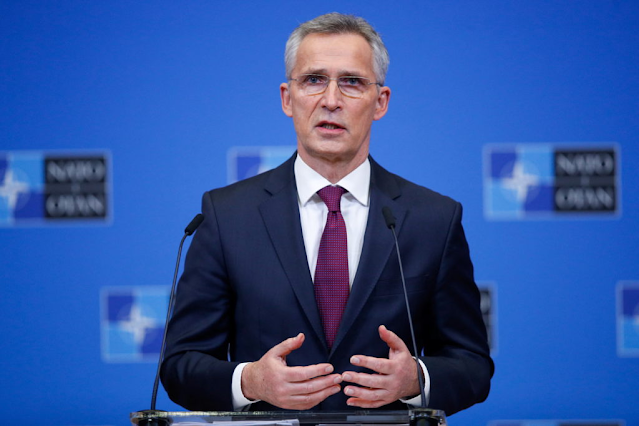NATO is in Talks to Deploy More Nuclear Weapons Due to Growing Threats from Russia, China, and North Korea
NATO is currently engaged in discussions to deploy more nuclear weapons, responding to increasing threats from Russia and China.
Jens Stoltenberg, the head of the alliance, has emphasized the importance of transparency about NATO's nuclear capabilities to send a clear message to potential adversaries.
In a recent interview, Stoltenberg revealed that NATO members are actively consulting on the possibility of taking missiles out of storage and placing them on standby.
He stressed that while operational details regarding the number of nuclear warheads and their deployment remain confidential, the necessity for these consultations is paramount given the current global security climate.
“Nato’s aim is, of course, a world without nuclear weapons, but as long as nuclear weapons exist, we will remain a nuclear alliance, because a world where Russia, China and North Korea have nuclear weapons, and Nato does not, is a more dangerous world.”Mr Stoltenberg said.
The rationale behind this move is to deter aggression by showcasing NATO's nuclear readiness.
Stoltenberg highlighted that transparency is a critical component of this strategy, contrasting with the past when nuclear exercises were conducted in complete secrecy.
Today, NATO openly acknowledges contributions from its 32 allies, such as the Netherlands, which has invested in dual-capable fighter jets that can carry U.S. nuclear weapons.
Stoltenberg articulated a clear stance: while NATO aspires to a world without nuclear weapons, it must remain a nuclear alliance as long as such weapons exist.
This is especially crucial in a world where Russia, China, and North Korea possess nuclear arsenals.
He warned that China is heavily investing in modern weaponry, including nuclear arms, with projections suggesting its arsenal could reach 1,000 warheads by 2030.
This evolving threat landscape implies that NATO might face the unprecedented challenge of dealing with two nuclear-armed adversaries simultaneously—Russia and China.
This potential scenario underscores the need for a robust and modernized nuclear deterrent within NATO.
Both the U.S. and the UK have committed their nuclear deterrents to the alliance, with other European allies contributing by storing weapons and enhancing launch capabilities.
NATO’s strategy also involves modernizing existing nuclear assets.
The U.S. is updating its gravity bombs in Europe, while European allies are upgrading their aircraft for nuclear missions.
The UK continues to maintain and modernize its own nuclear deterrent, underscoring its unique position within NATO.
Recent geopolitical developments, such as the presence of a Russian submarine near the UK and political shifts in France, further complicate the security environment.
Stoltenberg noted the importance of maintaining NATO's strength and unity in the face of these challenges.
He affirmed that despite differing political views within its member states, NATO has consistently garnered strong support, reinforcing the alliance's stability and cohesion.
In conclusion, NATO's proactive stance on nuclear weapon deployment is a strategic response to a more dangerous world.
By maintaining a credible nuclear deterrent and ensuring transparency, NATO aims to safeguard its member states and deter potential adversaries.
As Stoltenberg aptly put it, a world where NATO remains a nuclear alliance is safer than one where its adversaries have nuclear capabilities and it does not.












Comments
Post a Comment
Good days are on the way...